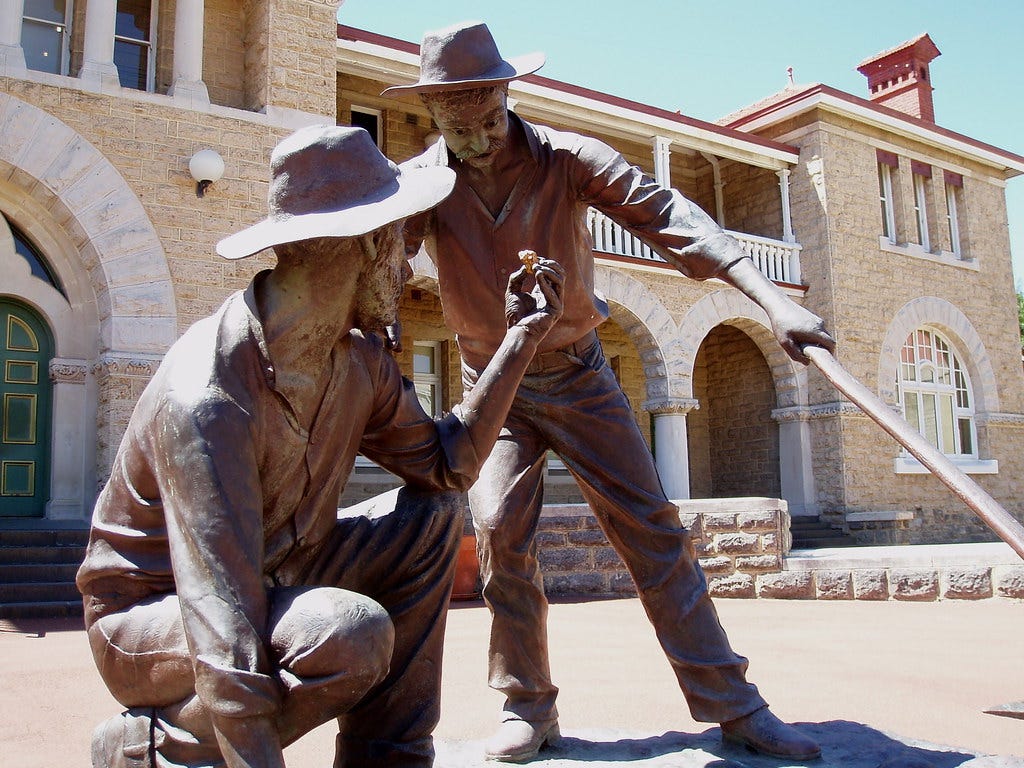
The Australian government’s Perth Mint has been caught lead-handed [sic]. The historic mint is facing a potential recall of gold bars after allegedly selling diluted bullion to China and then knowingly covering it up.1 Now, the mint didn’t go so far as to send gold-painted bricks à la Hogan’s Heroes2, but the claim is that they “doped” the gold (adding impurities like silver or copper) beyond the acceptable purity standards of the Shanghai Gold Exchange (SGE). Apparently, the doping program began in 2018 as a cost-saving measure. Ya don’t say!
This revelation is at odds, of course, with the Perth Mint’s tagline, “Inspiring excellence in the industry since 1899.”3 It certainly inspires something, but it ain’t excellence.
This is a huge story that is seemingly getting little coverage. Here you have a “trusted” institution—the Perth Mint—running a sophisticated scam, allegedly. It is apt to repeat Murray Rothbard’s point that, “the State is a gang of thieves writ large.”
Perhaps the relative lack of media coverage was, and is, simply due to the distractions of other major issues of the day. Or perhaps, it’s because China is treated as persona non-grata by western media as the war drums continue to amplify.4 If Australia was ripping off the UK, the reactions may certainly be different.
China, of course, is not innocent of gold scams either. Just a few years ago, Kingold Jewelry—a NASDAQ-listed company based in Wuhan (of all places)—got caught in, arguably, the gold scam of the century. Kingold used gold as collateral for years as they amassed a debt on the order of ~$5 billion. Well, when it came time to repay the debt in gold, it turned out that Kingold’s bars were just copper bars wrapped in gold!5 This is another fascinating story for another day. Anyway, back to the Perth Mint.
The Doping Program
An Australian TV show—Four Corners—broke a report that the Perth Mint began doping its gold in 2018 and how it withheld evidence from China to protect its reputation.6
Four Corners reported that, shortly after the onset of the program, refinery staff identified concerns of doping levels potentially exceeding limits of the SGE. But the doping continued without disturbance.
Well, the SGE advised the mint that they discovered two bars containing too much silver. Apparently, the concern was not made public by Shanghai, presumably out of caution. Regardless, the mint ordered and immediate internal investigation, and according to the report, the significant risk to reputation was well understood:
“If SGE—Gold Corporation's pre-eminent exchange client—had made public that they had issues with Gold Corporation bars … the impact of negative public statements on the business could be very significant. … it was possible for up to 100 tonnes of stock to be recalled from the Shanghai Gold Exchange for replacement.”
The doping program ceased after the internal investigation revealed the potential backlash. But the Perth Mint decided not to disclose the information, hence the accusations of “cover-up.”
The Government “Guarantee”
The Perth Mint operates under a government guarantee in accordance with the Gold Corporation Act 1987.7
“The payment of the cash equivalent of gold due, payable and deliverable by … the [Perth] Mint … under this Act … is guaranteed by the Treasurer, in the name and on behalf of the Crown in right of the State.”
The Perth Mint’s reputation is on the line. At this time, Shanghai chose not to make its complaint public and accepted assurances from the mint that certificates of assay would accompany all bars sent in the future. So as of today, the mint maintains its accreditation unless new information comes to light. We shall see.
Apparently, an ongoing investigation into the Perth Mint had already been initiated by financial crime regulator—Austrac—as a result of breaching anti-money-laundering and/or counter-terrorism laws. It appears the mint was buying and selling gold from unsavory characters.8 9
Will a government investigation of a government institution reveal the whole truth and nothing but the truth, especially with regards to China? Let’s just say I’m a bit skeptical.
If the mint is ever forced to recall the gold, the Western Australian Treasury (on behalf of the Crown, as silly at that sounds) would have to fork over the “cash equivalent” guarantee, which is defined at market price. So, my estimate of this equates to roughly over $6 billion (with a “b”) for 100 tonnes of doped gold.
Of course, when the government guarantees something “on behalf of the Crown,” what that really means is that the guarantee is backed by the wallets of the Australian people.10 Look out, mates!




